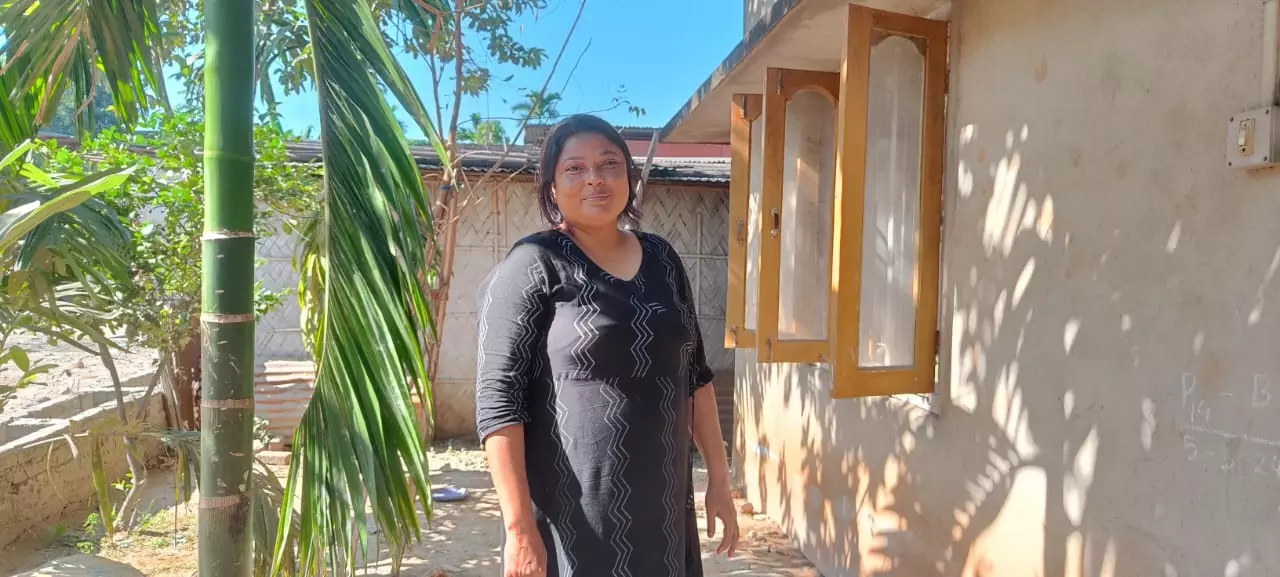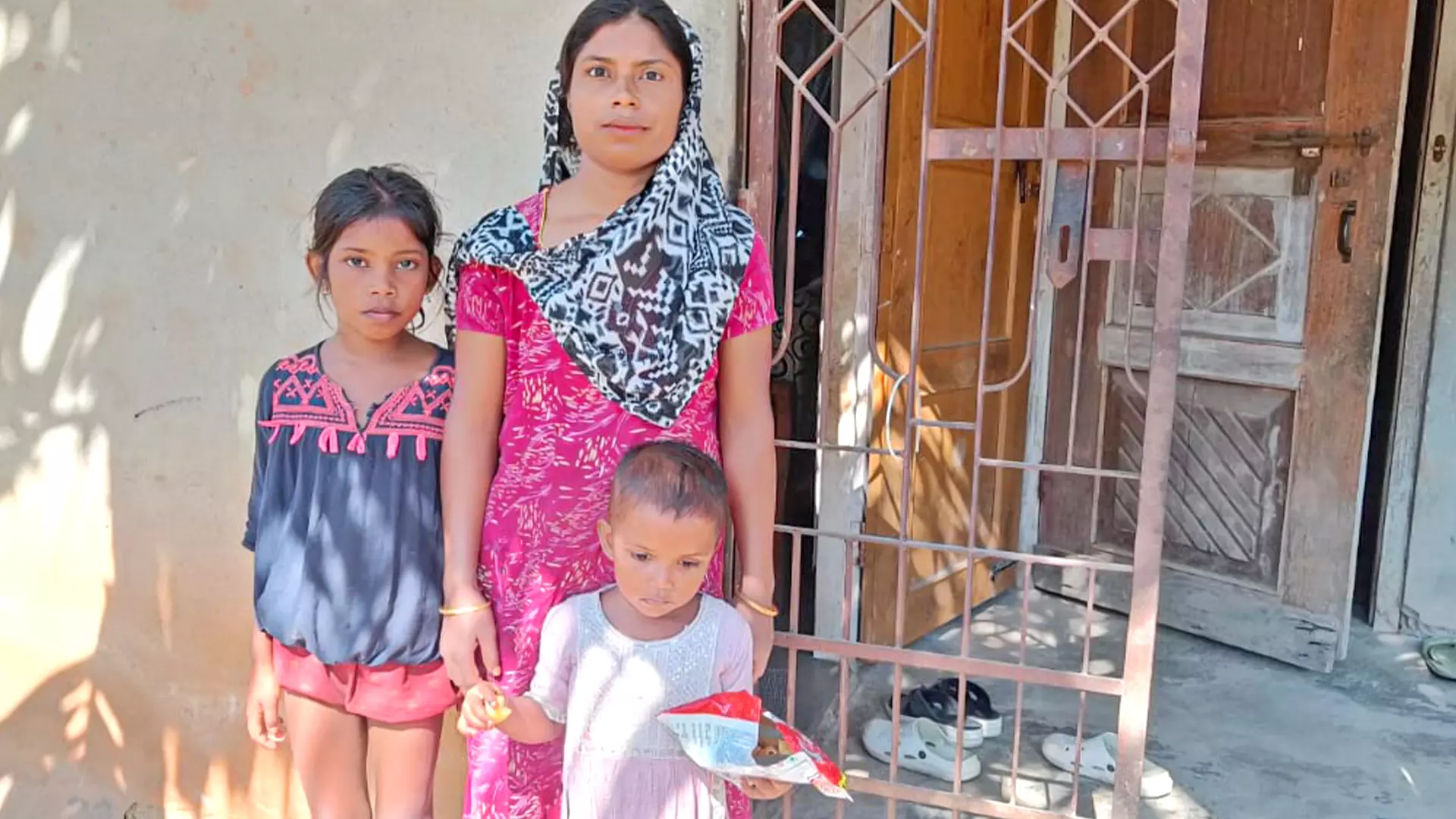
- Home
- India
- World
- Premium
- THE FEDERAL SPECIAL
- Analysis
- States
- Perspective
- Videos
- Sports
- Education
- Entertainment
- Elections
- Features
- Health
- Business
- Series
- In memoriam: Sheikh Mujibur Rahman
- Bishnoi's Men
- NEET TANGLE
- Economy Series
- Earth Day
- Kashmir’s Frozen Turbulence
- India@75
- The legend of Ramjanmabhoomi
- Liberalisation@30
- How to tame a dragon
- Celebrating biodiversity
- Farm Matters
- 50 days of solitude
- Bringing Migrants Home
- Budget 2020
- Jharkhand Votes
- The Federal Investigates
- The Federal Impact
- Vanishing Sand
- Gandhi @ 150
- Andhra Today
- Field report
- Operation Gulmarg
- Pandemic @1 Mn in India
- The Federal Year-End
- The Zero Year
- Science
- Brand studio
- Newsletter
- Elections 2024
- Events
How a long battle waged by Assam's domestic workers exposes political apathy

In June this year, Kamala Khatun from Assam's Guwahati met with an accident at her workplace. The 55-year-old domestic worker fell and broke her back. Months after treatment, Khatun is struggling to stand and needs a walker to move from her bed to the bathroom.Although the accident happened at her workplace, her employer did not offer any financial help for her treatment. Since the...
In June this year, Kamala Khatun from Assam's Guwahati met with an accident at her workplace. The 55-year-old domestic worker fell and broke her back. Months after treatment, Khatun is struggling to stand and needs a walker to move from her bed to the bathroom.
Although the accident happened at her workplace, her employer did not offer any financial help for her treatment. Since the accident occurred towards the end of June, Khatun's employer paid her the month's salary. "After that, they never met and asked me about my well-being. They did not offer me any monetary help to undergo medical treatment which ran into more than a lakh rupees. Because of the accident, I have become disabled and can't work and earn my livelihood. I am a poor woman. All my life I have been working. I don't know what will happen to my family and me," Khatun told The Federal.
Ruksana (name changed to protect her identity) is another domestic worker from Guwahati. The 21-year-old alleged that her former employer sexually abused her. When she complained about it, her employer and his wife locked her inside a room in their flat for three hours.
After her screams alerted the neighbourhood, her employer opened the door. The incident happened earlier this year.“Despite her ordeal, Ruksana decided not to approach the police. She feared approaching the police would make her look like a 'troublemaker' and she would not get any work in the future," said Touhida Begum, president of Kamrup district of the Grihokarmi Adhikar Suraksha Samiti, or GASS.
The GASS is a domestic workers’ collective in Assam.
Tales of abuse and hardship
“Stories of abuse, discrimination and financial hardship faced by domestic workers are abundant. Each of them has one or other such story to share. These informal workers toil at their workplaces and homes, but there is no justice. They are extremely vulnerable to all forms of injustices because of their class, gender, caste and religion (many of them belong to the Muslim community)," added Begum, president of Kamrup district, GASS.
Begum, 45, is also a teacher working with marginalised people for almost two decades now.
It is to end discrimination against women like Kamala and Ruksana, the GASS has demanded that the Assam government form a social security board to address grievances and implement welfare schemes for domestic workers.

Touhida Begum is also a teacher working with marginalised people for almost two decades now.
A fight for minimum wages, aids
The workers, mostly females, say the board is required to ensure that they get their rights, including minimum wages, weekly leave, medical aid, scholarships for their children and old-age pension.
"Unfortunately, the government is not listening to our demands. Domestic workers have long been treated with utmost disregard. Every rich and middle-class household hires a domestic help. But they are paid little, made to do a lot of work and often abused," said Begum, president of Kamrup district, GASS.
"We will continue to put pressure on the government until our demands are met," she added.
In the last five years, the members of GASS met several government officials and politicians. They submitted petitions to the authorities to fulfil their demands. All these efforts failed to garner any support or empathy from the political class.
A first: When Assam’s politicians talk about domestic help
In March 2023, the GASS' constant campaign made the authorities move when issues related to domestic workers were raised in the Assam Legislative Assembly for the first time.
Congress leader Debabrata Saikia moved a private member bill, the Assam Domestic Workers (Regulation of Work and Social Security) Bill, 2023, in the Assembly.
"Domestic workers should get social security as they work in the unorganised sector. Some national rules seek registration, a minimum wage structure, redressal of grievances, etc., for people working in the unorganised sector under the Unorganised Workers' Social Security Act of 2008.
"However, the provisions under this Act are not followed in Assam. They get inadequate wages, and the female workers get less than their male counterparts. In some cases, children also work as domestic helpers. The state government should accept this private member bill for the social security of domestic workers," Saikia, the leader of opposition, said in the Assembly.
The Bharatiya Janata Party has been in power in the state since 2016. Saikia withdrew the bill hoping that the government would fulfil the demands. However, that is yet to happen.
Assam flouts social security act
The Unorganised Workers' Social Security Act of 2008 was enacted to provide social security to all informal workers, including domestic workers, relating to provident fund, employment, injury benefits, housing, education schemes for children, skill upgradation of workers, financial assistance and old age homes.
Eleven states and union territories have formed social security boards for unorganised labour. These include Karnataka, Chandigarh, West Bengal, Assam, Orissa, Gujarat, the Andaman and Nicobar Islands, Tripura, Rajasthan and Andhra Pradesh. Separate domestic welfare boards have been established in Maharashtra, Kerala, Tamil Nadu and Jharkhand.
The Congress leader spoke in the Assembly based on a draft prepared by four non-governmental organisations-- Youth for Unity and Voluntary Action or YUVA, Indo-Global Social Service Society, Society for Social Transformation and Environment Protection and Centre for Development Initiatives--working in Assam. These organisations prepared an exhaustive draft that runs into more than 40 pages.
The draft preparation took several months as the members of these organisations spoke to hundreds of domestic workers so that their issues and struggles could be outlined in the document.
'Lack of legal protection for domestic help'
"The need for domestic workers has increased dramatically during the previous few decades. People who lack other skills gravitate to domestic work because of poverty, which has also driven them to move in search of employment. As a result of such enduring misfortune, millions of women and children of both sexes have been the victims of trafficking and other forms of exploitation.
"Lack of legal protection has resulted in widespread exploitation of women and children, including failing to pay domestic workers a living wage and forcing them to work long hours. The lack of adequate food and living/sleeping space, limitation of freedom of movement, isolation, exposure to harassment and sexual exploitation by agents during transit and work are all issues that live-in domestic workers must deal with," noted the first two paragraphs of the draft.
Some of the key points of the draft are the registration of domestic workers, employers and service providers under the social security board, domestic workers should be made beneficiaries under the board even upon their retirement age of 60, every domestic worker should be given an identity card, the role, rules and budgetary allocation of the board, under the board every district shall have a POSH (Prevention of Sexual Harassment Policy at Workplace) committee to address the cases of sexual harassment at workplace, creation of domestic workers social security and welfare fund, duties of employers and service providers, fixed working hours (not more than 48 hours a week), weekly holidays, wages for overtime work, rest period during working days, the government should fix minimum wages, domestic workers should be entitled to paid sick (15 days a year), weekly (once a week) and annual (15 days a year) leaves, end of employment should precede notice period for both the employers and employees, domestic workers should get basic amenities and crime-free environment in their workplaces, no child should be employed as domestic worker, formation of grievance redressal committees and legal aid.

Domestic workers of Guwahati, Assam pose for a picture after one of their regular meetings.
"In India, almost every family with a 'decent income' has domestic help. They are often female helpers, who diligently support these households by cooking, cleaning and caring for children and the elderly. Domestic workers form a pertinent but hugely disregarded segment within the informal workforce," said Bhaskar Kalita, community organiser, YUVA.
According to the National Domestic Workers’ Movement, India has around 4.2 million domestic workers. Experts say the number could be more than 50 million, with 75 per cent being women. There are no official statistics regarding the number of domestic workers in Assam. A rough estimate assumes that Guwahati, the biggest city in the state, has more than 60,000 such informal workers. Activists say the numbers would run into lakhs across Assam.
Domestic work: Poor women’s way of survival
Mihiron Begum is a young and upcoming leader among domestic workers of Guwahati. She is a mother of two daughters, one is seven years old and another is three.
"I joined the workforce two years ago. My husband does not like me going out and working. I work in two households to have my own income and contribute to my family's finances. I earn Rs 3,000 a month. My husband works as a well-digger. His income is inconsistent but we are somehow managing. But I am worried about the education of my daughters," Begum said.

Mihiron Begum poses with her two daughters.
"In a short period of time, I have met many domestic workers like me. They are all poor women like me. Most of us are school dropouts and married at a young age. Many of us are migrant workers from Barpeta, Dhubri and other districts. Along with facing problems at workplaces, many of us are victims of domestic violence," she added.
The members of GASS meet at various localities of Guwahati like Hatigaon, Bhangagarh, Uzan Bazar, Christian Basti, Narakasura and Dajshingaon, to name a few, on a regular basis. Some of the localities of Guwahati have self-help groups run by these domestic workers.
"We mostly talk about our happiness and sadness. We spend a few hours together every week to re-energise ourselves and face the world with some strength," Mihiron smiled as she attended a recent meeting at the house of the president of Kamrup district, GASS.
